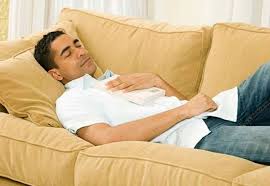Is It Worth Your Time To Take A Nap?
Winston Churchill, John F. Kennedy, Ronal Reagan, Napoleon, Albert Einstein, Thomas Edison and George W. Bush all regularly took time from their busy schedules to enjoy an afternoon nap. Even your dog takes naps, your kids take naps, and chances are your 80-year-old grandma takes naps. In fact, 85% of mammals take time for a relaxing afternoon nap.
But most working age Americans don’t. A 2009 study found that only one third of American adults take naps on a regular basis—probably because our fast paced work schedules just don’t allow time for this childhood pleasure. And, of course, there are stigmas associated with napping, such as laziness, lack of ambition and low standards.

But, would we actually be more productive, smarter, healthier and easier to get along with if we all took naps? Let’s consider this from an ancestral/biological perspective. Our ancestors needed continued vigilance at night to protect themselves from predators or other dangers, making it difficult to sleep uninterrupted for 7 hours. They also lived closely in small groups so they constantly dealt with the needs of infants and young children throughout the night. Pebbles and Bamm-Bamm were likely to wake up the entire clan when they couldn’t sleep through the night. Also, the relaxed pace of our ancestors lent itself to afternoons of dozing into never-never land.
People in other cultures around the world still enjoy an afternoon nap as part of their normal workday. Siestas are common in Spanish-speaking countries, including Mexico, Costa Rica, Ecuador and Spain. These short afternoon naps are also common in Italy, Greece, the Philippines and Nigeria. In China, napping is done almost religiously after lunch. However, it seems our fast-paced American lifestyle just doesn’t lend itself to napping.
It turns out that napping may provide benefits that could be worth the time.
- Data from the National Sleep Foundation suggests, “a well-timed afternoon nap may be the best way to combat sleepiness.”
- Gregory Blenky, MD, Research Professor and Director of the Sleep and Performance Research Center, says a nap can help make up for insufficient sleep, and that “it’s even possible that divided sleep is more recuperative than sleep taken in a single block.”
- Mark Rosekind’s studies with NASA pilots found that napping pilots had a 34% increase in performance and 54% boost in alertness that lasted 2 to 3 hours.
- The Center for Applied Cognitive Studies says that during a 10 to 20 minute afternoon nap, your brain cells reset their sodium potassium ratios, which are thrown out of balance during long periods of intense brain arousal. This imbalance is the main cause of what is known as “mental fatigue.” A brief nap can restore the ratio to normal, resulting in mental refreshment.
- Studies in Greece indicate that people who nap have a lower heart attack risk.

A 10 to 20 minute nap can help improve mood, alertness, performance, and memory. The Center for Applied Cognitive Studies says, “the length of sleep is not what causes us to be refreshed upon waking.” The key factor is the number of complete sleep cycles we enjoy. Each sleep cycle lasts about 90 minutes and contains 5 distinct phases, which exhibit different wave patterns. Leading researcher Dr. Claudio Stampi found that naps taken in the afternoon (a common low energy period for our circadian rhythms) were comparatively higher in the most restorative slow wave sleep.
So it looks like the ancestral/biological evidence indicates that an afternoon nap may be worth the time. So, here are a few tips to help you get the most from your naptime.
- Plan to nap for 10 to 20 minutes. Short naps are best. The longer you nap, the more likely you are to feel groggy.
- Set an alarm. It’s easier to relax when you have a safety valve to keep you from oversleeping.
- Take naps in the afternoon around 2 or 3. This is the time of day most people experience a lower level of alertness, and anything later could interfere with nighttime sleep.
- Elevate your feet to allow blood to flow more easily from your legs to the rest of your body.
- Create a peaceful environment by turning out the lights, closing the door and silencing electronic devices.
If you’re still wondering whether or not you should doze off in the afternoon, here’s a little demographic information. The 2009 study found that 21% of people making $75,000 to $99,000 a year take regular naps. Among people making more than $100,000, 33% take naps.
Wake me up in 15 minutes!
Stay Strong,
Bo Railey

